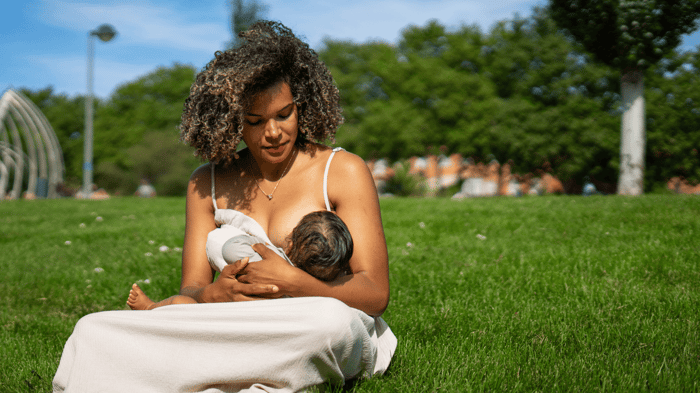Table of Contents
- Why Intimate Self-Care Deserves the Spotlight
- The Hormonal Rollercoaster Explained
- Daily Rituals for Healing From the Inside Out
- Moisture Matters: Addressing Postpartum Dryness
- Relearning Intimacy After Baby
- The Power of Rituals
- When to Call Your Doctor
- Bridging Tradition and Modern Science
- Reclaim Your Juicy Self
- FAQs
Motherhood is life-changing. You’ve carried a baby, birthed a baby, and now you’re feeding, soothing, rocking, and surviving on broken sleep. Everyone reminds you to eat well, rest when you can, and keep the baby’s pediatric appointments. But who’s reminding you to care for yourself—especially for the parts of your body that carried the greatest load?
Postpartum self-care for intimate health is often skipped over, whispered about, or avoided entirely. But intimacy, comfort, and vaginal health are not luxuries—they are core aspects of recovery. Ignoring them can lead to ongoing discomfort, infections, and a sense of disconnect from your own body. Embracing them can mean rediscovering confidence, pleasure, and comfort in everyday life.
This isn’t a quick-fix checklist. It’s a deep dive into what your body goes through, why intimate health matters, and how you can reclaim your juicy self with compassion, rituals, and a little science-backed support.
Why Intimate Self-Care Deserves the Spotlight
We often equate postpartum care with losing baby weight or healing scars. But intimate self-care is more than appearance—it’s about how you feel. The vaginal tissues, pelvic floor, and hormonal balance all influence how comfortable you are in your own skin.
Postpartum intimate care helps:
Prevent infections. A dry, imbalanced vaginal environment is more prone to bacterial vaginosis or yeast infections.
Protect long-term pelvic health. Stronger pelvic floor muscles mean better bladder control and reduced risk of prolapse.
Improve comfort. Less dryness, irritation, and pain in daily activities.
Boost emotional well-being. Reconnecting with your body eases feelings of loss or disconnection.
Enhance intimacy. Both with yourself and with your partner, once you’re ready.
It’s not indulgence. It’s essential.
The Hormonal Rollercoaster Explained
Right after birth, estrogen and progesterone levels fall dramatically. These hormones that once kept tissues plump, elastic, and well-lubricated are suddenly gone. If you’re breastfeeding, high prolactin levels keep estrogen low, extending dryness and sensitivity.
Other hormones come into play:
Oxytocin: surges with breastfeeding, bonding you to your baby. It also causes uterine contractions to help your body heal, but it may lower libido.
Cortisol: stress and sleep deprivation can keep this hormone high, slowing down healing and lowering mood.
Relaxin: though it drops after birth, its lingering effects can keep joints and tissues looser, influencing pelvic stability.
Understanding these shifts helps you see that your body isn’t betraying you—it’s recalibrating. And with care, you can support that recalibration toward comfort and balance.
Daily Rituals for Healing From the Inside Out
Healing isn’t about giant leaps. It’s about small, repeatable acts that nurture your tissues and your soul.
Hydration as medicine. Dehydration makes dryness worse. Keep a large water bottle near your nursing chair or bed, and sip throughout the day. Add lemon or cucumber to make it feel refreshing.
Food as repair.
Protein builds and repairs tissue. Eggs, chicken, beans, and lentils are your allies.
Vitamin C boosts collagen repair—load up on citrus, berries, peppers.
Zinc supports wound healing and tissue strength (pumpkin seeds, seafood, whole grains).
Omega-3s reduce inflammation—fatty fish, chia seeds, or algae supplements.
Phytoestrogens in flax, soy, and oats gently support moisture balance.
Gentle movement. Walking helps circulation and prevents clots. Pelvic tilts and diaphragmatic breathing gently reactivate the core and pelvic floor.
Hygiene rituals. Choose pH-balanced, unscented cleansers. Sitz baths soothe swelling and encourage blood flow. Cotton underwear and breathable pads minimize irritation.
These rituals, though simple, create a foundation for recovery.
Moisture Matters: Addressing Postpartum Dryness
Vaginal dryness isn’t just about sex—it can make daily life uncomfortable. The good news is, there are options:
Lubricants: best for intimacy, offering instant relief.
Moisturizers: used regularly, they hydrate tissues over time.
Plant-based oral supplements: formulas like She Juicy™ nourish the vaginal mucosa from within, restoring natural balance without hormones or synthetic additives.
Choose what suits your lifestyle. The key is consistency. Moisture is not a luxury—it’s a shield for your comfort and confidence.
Relearning Intimacy After Baby
Intimacy postpartum is not about “getting back to normal.” It’s about exploring new normal.
Start with reconnection. Focus on closeness, touch, cuddling, massages, or simply lying skin-to-skin. Pressure-free intimacy strengthens bonds.
Take it slow. When you’re ready for sex, lubricants are your best friend. Start with positions that put less pressure on healing tissues.
Explore new sensations. Your body may respond differently now—embrace the discovery.
Talk openly. Use phrases like:
“I want to feel close, but I’m not ready for penetration yet.”
“This position feels more comfortable.”
“Let’s pause—I need more time.”
Pleasure after birth is not about rushing back; it’s about building forward.
The Power of Rituals
Rituals ground you when everything feels chaotic. They don’t have to be elaborate:
Five minutes of gratitude journaling for your body.
A nightly cup of calming tea.
A short meditation or breathwork practice to connect with your pelvic floor.
These small rituals shift healing from a clinical task to a soulful practice. They remind you that your body deserves devotion.
When to Call Your Doctor
Self-care is powerful, but it doesn’t replace medical care. Reach out if you notice:
Bleeding is heavier than a period after the first few weeks.
Persistent fever, chills, or foul-smelling discharge.
Pain that worsens instead of improving.
Leaking urine or stool that doesn’t resolve with gentle pelvic floor work.
Pain during sex that persists for months.
Seeking help is not weakness. It’s part of smart, empowered care.
Bridging Tradition and Modern Science
Across cultures, postpartum traditions have always emphasized care: herbal baths, belly binding, warm foods. Modern science now affirms many of these practices while offering new tools like pelvic floor therapy, natural vaginal moisturizers, and hormone-free supplements.
Blending them is not contradiction—it’s wisdom. You can honor tradition while embracing innovation.
Reclaim Your Juicy Self
Motherhood reshapes you, but it doesn’t erase you. With hydration, nutrition, pelvic floor care, rituals, emotional support, and natural aids like She Juicy, you can move from survival to thriving.
Postpartum self-care for intimate health is about more than dryness or discomfort—it’s about wholeness, empowerment, and joy.
Because you deserve to feel juicy, confident, and powerful—today, tomorrow, and in every chapter of your motherhood journey.
FAQs
How long does postpartum dryness last?
It varies. Some notice improvement in weeks, others throughout breastfeeding. Hormones, stress, and personal biology all play a role.
Can supplements help while breastfeeding?
Many plant-based, hormone-free supplements are safe, but always confirm with your provider.
What if intimacy is painful months later?
Persistent pain is not normal. A pelvic floor physical therapist or gynecologist can identify and treat the cause.
Do C-section moms need intimate self-care too?
Absolutely. Hormonal shifts affect all postpartum women, not just those with vaginal deliveries.









